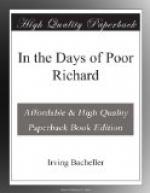“I am the chief scout of the Great Father. My word is like that of old Flame Tongue—your mighty chief. You and your people are on a bad errand. No good can come of it. You are far from your own country. A large force is now on your trail. If you rob or kill any one you will be hung. We know your plans. A bad white chief has brought you here. He has a wooden leg with an iron ring around the bottom of it. He come down lake in a big boat with you. Night before last you stole two white women.”
A look of fear and astonishment came upon the face of the Indian.
“You are a son of the Great Spirit!” he exclaimed.
“And I would keep yer feet out o’ the snare. Let me be yer chief. You shall have a horse and fifty beaver skins and be taken to the border and set free. I, the scout of the Great Father, have said it, and if it be not as I say, may I never see the Happy Hunting-Grounds.”
The brave answered:
“My white brother has spoken well and he shall be my chief. I like not this journey. I shall bid them to the feast. They will eat and sleep like the gray wolf for they are hungry and their feet are sore.”
The brave put his horn to his mouth and uttered a wild cry that rang in the distant hills. Then arose a great whooping and kintecawing back in the bush. The young Huron went out to meet the band. Returning soon, he said to Solomon that his chief, the great Splitnose, would have words with him.
Turning to John Irons, Solomon said: “He’s an outlaw chief. We must treat him like a king. I’ll bring ’em in. You keep the meat a-sizzlin’!”
The scout went with the brave to his chief and made a speech of welcome, after which the wily old Splitnose, in his wonderful head-dress, of buckskin and eagle feathers, and his band in war-paint, followed Solomon to the feast. Silently they filed out of the bush and sat on the grass around the fire. There were no captives among them—none at least of the white skin.
Solomon did not betray his disappointment. Not a word was spoken. He and John Irons and his son began removing the spits from the fire and putting more meat upon them and cutting the cooked roasts into large pieces and passing it on a big earthen platter. The Indians eagerly seized the hot meat and began to devour it. While waiting to be served, some of the young braves danced at the fire’s edge with short, explosive, yelping, barking cries answered by dozens of guttural protesting grunts from the older men, who sat eating or eagerly waiting their turn to grab meat. It was a trying moment. Would the whole band leap up and start a dance which might end in boiling blood and tiger fury and a massacre? But the young Huron brave stopped them, aided no doubt by the smell of the cooking flesh and the protest of the older men. There would be no war-dance—at least not yet—too much hunger in the band and the means of satisfying it were too close and tempting. Solomon had foreseen the peril and his cunning had prevented it.




